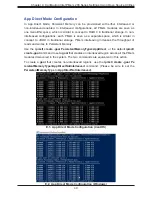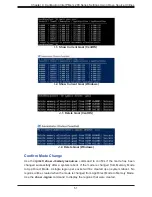
37
Chapter 3: Configuring Intel PMem 200 Series Settings Using BIOS
To Delete a Namespace in a Region (for App. Direct Mode Only)
To delete a namespace in a Region for App Direct (AD) Mode, please follow the steps listed
below.
•
Follow the instructions given in Sec. 4-1 to access the Namespaces submenu as shown
below.
B.30. Namespace Submenu Screen
•
If a namespace has been previously created, the information of the existing namespace
will display as shown below.
B.31. Existing Namespace Information Displayed
•
Enter the namespace you want to delete, the screen below will display.
B.32. Enter the Namespace to Delete
















































